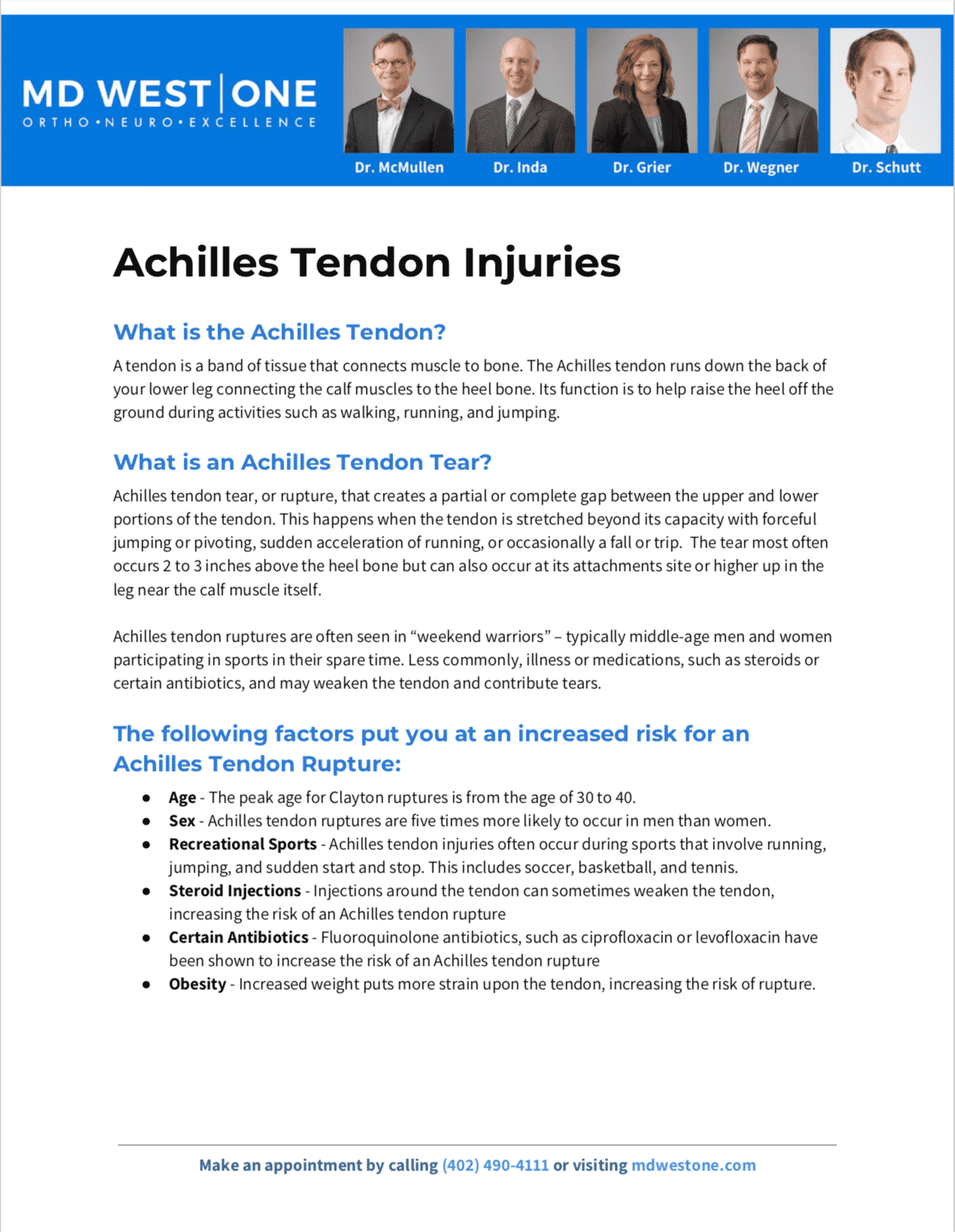Are you suffering from potential Morton's Neuroma?
The Omaha Foot & Ankle Specialists at MD West ONE are able to properly diagnose and treat Morton's Neuroma through both surgical and non-surgical treatments. If you have the following symptoms, you may want to make an appointment with one of our Board Certified Specialists.
- Sharp, stinging, or burning pain between the toes when you stand or walk
- Swelling between the toes
- Tingling (feeling pins and needles) and numbness in your foot
- Sense there is a bunched-up sock or small rock under the ball of your foot
- Pain that is worse when you wear high-heeled shoes or stand on the balls of your feet
Meet MD West ONE's foot and ankle specialists and learn more about how they treat Morton's Neuroma.
Morton's Neuroma Causes, Treatments & Surgery
What is the Morton's Neuroma?
Getting treatment for Morton’s Neuroma is important. The neuroma can become larger without treatment. The nerve damage may become permanent.
The following factors put you at an increased risk for Morton's Neuroma:
-
Foot shape: If you were born with flat feet, high arches, or toes in an unusual position, you might have instability around the toe joints. That instability can lead to Morton’s Neuroma.
-
Certain medical conditions: Some foot conditions that develop over time can raise your risk of developing Morton’s Neuroma. Examples include bunions and hammertoes.
-
Sports: Sports such as running, tennis, and other racquet sports require a lot of pressure on the balls of your feet as you run. Athletes are also more likely to injure their foot, which can lead to Morton’s Neuroma.
-
Shoe choice: High heels (more than 2 inches high) can cause problems. So can tight-fitting, narrow or pointed-toe shoes. All these shoes put extra pressure on the balls of your feet and limit toe movement.
Ways to Decrease Your Risk of Developing Morton's Neuroma:
- Do not wear tight or high-heeled shoes for long periods.
- Wear shoes with a wide toe box, so your toes are not cramped.
- When you are more active, wear athletic shoes with plenty of padding to cushion the balls of your feet.
- Maintain a healthy weight, since extra pounds put more pressure on your foot.
- For athletes, talk to your coach or trainer to discuss tweaking activities for less pressure on the foot.
DIAGNOSIS
During an examination, your healthcare provider will:
- Look at your feet, to see if there is a mass between the toes.
- Put pressure on the spaces between the toe bones to figure out the location of the foot pain.
Most of the time, your provider can diagnosis Morton’s Neuroma based on your symptoms and a physical exam. An X-ray will not show a neuroma. But it can help rule out other conditions that cause foot pain, such as a stress fracture or arthritis. You may also need an ultrasound or MRI to confirm the diagnosis.
Sometimes, your provider may recommend an electromyography procedure. This test measures the electrical activity of your nerves and muscles. It can rule out nerve conditions that can cause symptoms like those of Morton’s Neuroma.
NON-SURGICAL TREATMENT OPTIONS
Treatment depends on the severity of the neuroma. There are several treatment options, from those you can do on your own to those done by a healthcare provider. You may need a combination of treatments to get the most relief.
These steps may improve your symptoms:
- Wear good shoes: Choose supportive shoes with a wide toe box. Shoes with shock-absorbent soles and proper insoles can help. Do not close the top of the shoe too tightly. And avoid shoes that are tight, have pointed-toes or have heels more than 2 inches high.
- Use shoe pads: Put these over-the-counter pads into your shoe to relieve pressure.
- Use an ice pack: Place an ice pack on your toes to reduce pain and swelling.
- Rest: Try to rest and massage your feet. Avoid sports and other activities that put a lot of pressure on your foot.
What medications can help with Morton’s Neuroma?
Your provider may recommend medications that can relieve pain and other symptoms.
Medications include:
- Steroid injections.
- Alcohol sclerosing injections, where a provider injects an alcohol solution to reduce nerve pain.
- Nonsteroidal anti-inflammatory drugs (NSAIDs) such as ibuprofen or aspirin, taken by mouth.
- Anti-inflammatory drugs injected into the skin.
- Local anesthetic injection to numb the nerve and relieve pain.
Can orthotics treat Morton’s Neuroma?
Orthotics are custom shoe inserts that can reduce some of the pain of Morton’s Neuroma. A healthcare provider adjusts orthotics to your foot shape. You wear them in your shoe to take the pressure off the painful nerve. Metatarsal pads in your shoe inserts and removable metatarsal pads can also offload the ball of your foot where you are having pain.
SURGICAL TREATMENT OPTIONS
If medications and other treatments have not worked, your healthcare provider may recommend foot surgery. A neurectomy is the most common surgery for Morton’s Neuroma. The surgeon removes part of the nerve tissue. Surgery can be a successful treatment for Morton’s Neuroma. Some people have permanent numbness in the affected toe, though.
Frequently Asked Questions?
Is Morton’s Neuroma a tumor?
The “neuroma” in Morton’s Neuroma is slightly misleading. Neuromas are noncancerous (benign) tumors found on nerves throughout the body. They involve a growth of extra nerve tissue.
With Morton’s Neuroma, there is no growth and no tumor. Instead, the existing tissue around the nerve becomes inflamed and gets bigger.
Usually, the neuroma happens between the bones of your third and fourth toes. Those are the two toes closest to the pinky toe (toe No. 5). But Morton’s Neuroma can form between the second and third toes as well.
You develop the condition when the nerve suffers excessive pressure or compression between the toes. That compression (squeezing) causes inflammation and irritation.
W
An irritated or damaged nerve between the toe bones causes Morton’s Neuroma. You feel it on the ball of your foot. Common causes of the nerve reacting this way include:
- Being born with a congenital foot problem.
- Pressuring the ball of the foot while running during certain sports.
- Wearing shoes that prioritize style over support.
AMERICAN ORTHOPAEDIC FOOT & ANKLE SOCIETY
All of the foot and ankle surgeons in the practice are recognized members of the American Orthopaedic Foot & Ankle Society. It is the oldest and most prestigious medical society dedicated to the foot and ankle. The mission of the society is to advance science and practice of foot and ankle surgery through education, research, and advocacy on behalf of patients and practitioners. These physicians dedicate their time and energy to improving the patient experience and their knowledge in their field. For more information visit http://www.aofas.org.
MD West ONE Foot & Ankle Specialists:
The Foot & Ankle Specialists are all Board Certified and Fellowship-Trained, meaning they’ve focused their education, training and research on orthopaedic surgery of the foot and ankle.






